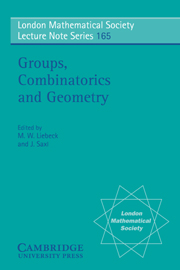Book contents
- Frontmatter
- Contents
- Authors' Addresses
- Introduction
- Part 1 Sporadic groups
- Part 2 Moonshine
- Part 3 Local and geometric methods in group theory
- Part 4 Geometries and related groups
- 17 Finiteness questions for geometries
- 18 Kac-Moody groups and, their automorphisms
- 19 Generalized hexagons as geometric hyperplanes of near hexagons
- 20 On simplicial complexes related to the Suzuki sequence graphs
- 21 Twin buildings and groups of Kac-Moody type
- Part 5 Finite and algebraic groups of Lie type
- Part 6 Finite permutation groups
- Part 7 Further aspects of simple groups
- Part 8 Related topics
19 - Generalized hexagons as geometric hyperplanes of near hexagons
Published online by Cambridge University Press: 07 September 2010
- Frontmatter
- Contents
- Authors' Addresses
- Introduction
- Part 1 Sporadic groups
- Part 2 Moonshine
- Part 3 Local and geometric methods in group theory
- Part 4 Geometries and related groups
- 17 Finiteness questions for geometries
- 18 Kac-Moody groups and, their automorphisms
- 19 Generalized hexagons as geometric hyperplanes of near hexagons
- 20 On simplicial complexes related to the Suzuki sequence graphs
- 21 Twin buildings and groups of Kac-Moody type
- Part 5 Finite and algebraic groups of Lie type
- Part 6 Finite permutation groups
- Part 7 Further aspects of simple groups
- Part 8 Related topics
Summary
Introduction.
The first theorem given here asserts that a geometric hyperplane H of a near hexagon, which intersects each quad at a star must be a generalized hexagon. The second theorem tells us that if a finite near hexagon with parameters possesses such a geometric hyperplane, then that near hexagon Γ must be the dual of a rank 3 polar space Δ. Moreover, there is a bijection H ↔ quads of Γ, which induces an embedding of the hexagon H into the polar space A which is an epimorphism on points. Conceivably, there is a possibility that generalized hexagons might be represented as geometric hyperplanes of some of the “other” dual polar spaces, such as Ω(n, ℝ) (with signature (n – 3,3)), Sp(6, κ), Ω−(8, κ), U(6, κ) or U(7, κ). But the final theorem shows that if Γ is finite, such possibilities cannot happen; that in fact Γ (and Δ) are type Ω(7, q) (or Sp(6, q) if q is even) and H is the hexagon of type G2(q) associated with the standard embedding of G2(q) (either as the stabilizer of an appropriate hyperplane in the 8-dimensional spin module for Ω(7, q) or as the stabilizer of a trilinear form in its natural 7-dimensional module – or the factor of this 7-space module by a 1-dimensional radical when q is even).
The author thanks Professor J. Tan for a valuable discussion, Queen Mary College, U. of London, and the Mathematisches Institute, Albert-Ludwigs Universität Freiburg for their kind hospitality during the writing of this work, and the Alexander von Humboldt Stiftung whose support made the research possible.
- Type
- Chapter
- Information
- Groups, Combinatorics and Geometry , pp. 229 - 239Publisher: Cambridge University PressPrint publication year: 1992
- 6
- Cited by

